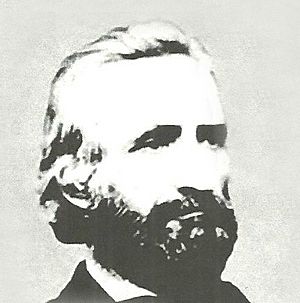Lucius B. Northrop facts for kids
Quick facts for kids
Lucius B. Northrop
|
|
|---|---|
 |
|
| Born | September 8, 1811 Charleston, South Carolina |
| Died | February 9, 1894 (aged 82) Pikesville, Maryland |
| Place of burial |
New Cathedral Catholic Cemetery, Baltimore, Maryland
|
| Allegiance | United States Army Confederate States Army |
| Years of service | 1831–61 (USA) 1861–65 (CSA) |
| Rank | |
| Unit | 7th U.S. Infantry 1st U.S. Dragoons |
| Commands held | Confederate Commissary Department |
| Battles/wars | 2nd Seminole War American Civil War |
Lucius Bellinger Northrop (born September 8, 1811 – died February 9, 1894) was an important officer during the American Civil War. He served as the Commissary-General for the Confederate States of America. This meant he was in charge of getting food, clothes, and supplies to the Confederate armies.
Northrop was a close friend of Jefferson Davis, who became the President of the Confederacy. Davis chose Northrop for this big job. Northrop's work was vital for soldiers, especially those in the Army of Northern Virginia. He also helped supply the camps where Federal (Union) soldiers were held as prisoners.
Contents
Early Life and Military Start
Lucius Northrop was born in Charleston, South Carolina. He attended the United States Military Academy in West Point, New York. He graduated in 1831. While there, he met Jefferson Davis, who would later become a key figure in his life.
After West Point, Northrop became a second lieutenant. He joined a type of cavalry unit called dragoons. He served in places like Florida Territory during the Second Seminole War. In 1839, he was hurt badly in his right knee by his own pistol. This injury meant he could no longer do active field duties.
For many years, Northrop was on sick leave from the army. He even studied medicine at Jefferson Medical College in Philadelphia. In 1848, he left the army because of his injury. He moved back to civilian life in Charleston and Anne Arundel County, Maryland.
However, his friend Jefferson Davis helped him return to the army. When Davis became the Secretary of War in 1853, he brought Northrop back. Even with his limp, Northrop was promoted to captain.
Challenges During the Civil War
When the Southern states began to leave the United States in 1861, Northrop resigned from the U.S. Army. He joined the secessionist cause. After Jefferson Davis became the Confederate president, he promoted Northrop to colonel. In March 1861, Northrop was made the Commissary-General.
In this role, Northrop was responsible for all supplies except weapons and ammunition. He had to move military goods and even Confederate troops. He also had to make sure Union prisoners in Southern camps received supplies. He held this job from March 1861 until February 1865.
Northrop faced huge problems trying to supply the Confederate armies. The South's economy was not ready for a long war. It was hard to make enough food, shoes, and clothing. Also, the South didn't have good ways to transport these goods. Their railroad network was wearing out, and they couldn't build new trains.
Another big problem was inflation. The value of the Confederate money dropped very quickly. This made it hard for Northrop's department to buy the supplies the armies needed.
Many people, including historians, felt Northrop's work was not good enough. Confederate soldiers often had very little food or supplies. They sometimes had to find food for themselves from local farms.
As the war went on, soldiers and politicians complained about Northrop. President Davis remained loyal to his friend. He knew the Confederacy faced huge supply problems. But the situation got worse, especially for Robert E. Lee's army during the Siege of Petersburg in 1864-1865. Lee's army was vital, but they were starving.
Davis tried to promote Northrop to brigadier general in November 1864. But he didn't send the promotion to the Confederate Senate. He knew they would likely reject it.
Eventually, many leaders felt Northrop had to go. When John C. Breckinridge became the Secretary of War, he insisted Northrop be removed. General Robert E. Lee also made it clear he wanted a change. Lee wrote that if the supply department wasn't fixed, the soldiers' strength would fail. Finally, Davis accepted Northrop's resignation in February 1865.
However, it was too late. Less than two months later, Lee's ill-fed army was defeated at the Battle of Five Forks. This led to the surrender at Appomattox.
Historian Bell I. Wiley studied the lives of Civil War soldiers. He believed Davis's loyalty to Northrop was a big mistake. Wiley noted that many people saw Northrop as inefficient. But Davis kept him in his job until the Confederate House of Representatives demanded his removal.
After the War
After the Civil War ended, Colonel Northrop was arrested in Raleigh, North Carolina, in June 1865. He was held for four months. This was because he had supported the Confederacy and because of the difficult conditions faced by Union prisoners during his time as Commissary-General.
After his release in November 1865, he lived a quiet life on a farm near Charlottesville, Virginia. His knee problems continued, and as he got older, he faced more health challenges. In 1890, he moved to the Maryland Line Confederate Soldiers' Home in Pikesville, Maryland. He passed away there in 1894. He is buried in New Cathedral Catholic Cemetery in Baltimore, Maryland.
Northrop's Papers
Collections of Northrop's writings and documents are kept in city libraries in New York City and Alexandria, Virginia.
 | DeHart Hubbard |
 | Wilma Rudolph |
 | Jesse Owens |
 | Jackie Joyner-Kersee |
 | Major Taylor |

